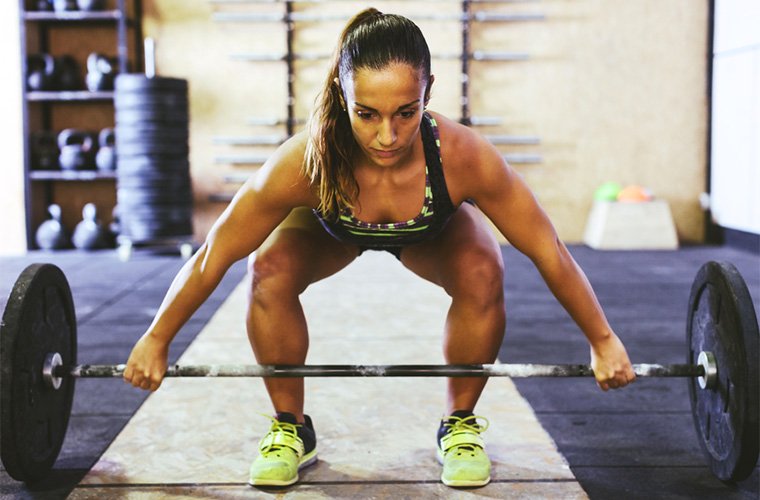One Side Effect of Weightlifting I Didn’t Expect? Tiny Holes in My Teeth
Spectacles resting on his nose, the dentist bent over me and told me something I hadn't been expected: I had tons of tiny holes in my teeth. He looked down at my arms (Disclosure: I wasn't flexing, exactly, but I was wearing a workout tank) and asked how often I strength train. When I told him five days a week, he said that was probably what was causing the unusual oral patterns. Curious to learn more, I consulted a few other dentists to figure out if that could actually be the case.

When exercise creates oral issues
Turns out teeth grinding and jaw clenching—otherwise known as bruxism—during exercise is actually pretty common. "I see this all the time in people who frequently exert themselves at the gym, or participate in high intensity exercise or sport," says Jeffrey S. Haddad DDS of Michigan Center for TMJ and Sleep Wellness. While stabilizing your jaw can have a significant increase in strength, stability, and flexibility, it comes with adverse symptoms and side effects, he says.
"Clenching or grinding during exercising puts a tremendous load on both the teeth and the jaw joints," adds Anita Myers, DDS author of Stunning Smiles! A Dental Guide to Improve the Way You Eat, Smile, & Live. Some folks clench, some folks grind, and others (like me) do both. "People who clench excessively might have chips, crack lines, holes, and fractures in their teeth. And those who grind—move their jaw left, right or forward— while exercising may also have gum recession, enamel wear, and tooth mobility," says Dr.Myers.
Before you log your annual appointment with your dentist (cheers, hygiene!)—Shab Krish DDS, MS, DABCP, author of Restore Your Rest: Solutions for TMJ and Sleep Disorders says symptoms like sensitivity to the cold or heat when eating or drinking, headaches, migraines, neck pain, ear pain, congestion, and jaw stiffness, are cues that your RGF is doing damage.

{{post.sponsorText}}
How to prevent oral damage
First things first: if you already have holes in your teeth, you're going to want to see a dentist and get them filled, because bacteria and germs can make their way into those divots and cause a cavity.
The first line of action against exercise-induced-bruxism is wearing a mouth guard. It creates a thin barrier between the teeth, which helps minimize the damage. "You can buy one at your local sports and drug store for cheap, but the ones made by and prescribed by your dentist are usually so thin and comfortable you'll forget you have one in," says Allison Rifkin, DMD of Rifkin Dental.
Dr. Haddad adds that it may be pricey, but it's worth it. "Wearing a properly made appliance that aligns and supports your jaw will not only protect your teeth, but protect the facial, head, and neck muscles."Think of it this way: If you're strength training, you're probably already geared-up with overpriced knee sleeves, weight-lifting belts, and heart rate monitors. What's one more thing added to the mix?
If you despise the thought of wearing a mouthguard, cosmetic dentist Sarah Jebreil DDS AAACD suggest setting an alert on your phone to ping every 5 or 10 minutes. "Have the alert ask you if you're clenching. Becoming conscious of when you're doing it, is really the only way to break the habit."
Dr. Krish also notes that nose-breathing during exercise is important. "It can improve your airflow and relax your jaw and neck muscles, which reduces clenching." In fact, one study published in the Scandinavian Journal of Medicine & Science in Sports found that mouth-breathing during exercise, dries your mouth out and leads to a reduction of tooth-protecting-saliva, which means even more tooth decay.
Who knows? By remedying your RGF and giving your teeth, jaw, and mouth extra TLC you could save yourself some time in the dentist chair later.
If you're also a sleep grinder, these 4 tips will help keep your choppers healthy.And here’s how to protect your teeth if you’re drinking apple cider vinegar on the daily.
Loading More Posts...